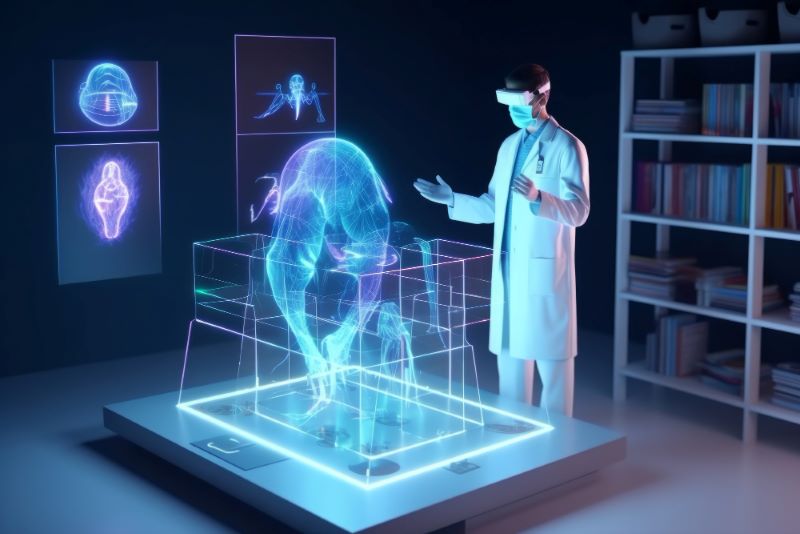A Comprehensive Guide on AI in Healthcare

Strong 8k brings an ultra-HD IPTV experience to your living room and your pocket.
Artificial Intelligence (AI) is rapidly transforming the healthcare industry, enhancing diagnostics, treatment, and recovery processes. By integrating AI, healthcare gains significantly in efficiency, accuracy, and patient experiences. This technology enables more personalized care by analyzing large datasets to predict, diagnose, and treat illnesses more effectively than ever before, significantly reducing errors and improving patient outcomes.
As per recent Accenture reports, AI in the U.S. healthcare industry is expected to save around $150 billion annually by 2026. This will have a spiraling effect on the medical structure of all the major developed and developing economies.
In order to leverage the growing market size, businesses can avail dedicated healthcare software development services from a reliable firm that can help them create complex AI-power tools & solutions for medical needs, paving the way for streamlined administrative tasks, patient management, and personalized treatment plans.
Since AI-backed predictive analytics is all about providing critical insights into disease outbreaks and resource optimization for treatment, the future of AI in healthcare is not simply about curing disease but preventing them, and supporting a healthier population.
This blog will help you dive into the present-day role of AI in the healthcare industry and the future of the technology.
Varied Impact of AI on the Healthcare Industry
AI-Driven Data Management
Data gathering & evaluation in healthcare is the first phase of treatment and its administration is streamlined by digital automation of AI integration. Healthcare institutions are turning to AI to prevent data losses and assist in segmenting & connecting relevant data with AI, which took years earlier for efficient management. Due to this, the demand for IoT solutions offered by reliable healthcare mobile app development companies has also grown in recent years.
Scanning and Ultrasound Technology
AI-power tools speed up the use of ultrasound apps from the clinical context. Using OCR (Optical Character Recognition) techniques is automating file scanning, classification of documents, and appropriate processing. Thus, it helps AI assist clinicians in taking a comprehensive approach toward patient care and long-term treatment commitments.
AI-Assisted Robotic Surgery
Medical robots have been enhancing healthcare for over a decade, including the use of advanced surgical robots that assist surgeons in performing precise procedures. AI further augments these robots by facilitating secure interactions between the robots and medical professionals. Additionally, these robotic tools are employed in laboratories for repetitive tasks, in physical therapy to aid recovery, and in managing chronic health conditions, significantly improving operational efficiency and patient care.
Drug Research & Manufacturing
Artificial Intelligence plays a major part in the drug industry and assists in the right product selection for manufacturing. The AI-enabled drug manufacturing tools support medical farms to create effective products and researchers are also taking the help of AI to develop new vaccines & medications. AI's role is crucial not only currently but also expected to be pivotal in future drug research and production, ensuring advancements in medicine and treatment options.
Treatment of Neurological Disorders
AI supports the treatment of peripheral & neurological disorders and so, different types of ML algorithms are being used for pattern recognition. AI-based treatment backs clinical decisions on brain pathology by identifying specific patterns, like the identification of AD (Alzheimer’s Disease) and different forms of cognitive impairments.
Enhanced Patient Care
The AI-powered virtual assistants power top-level patient care like scheduling appointments, suitable medical solutions, and also ensures that the patients get 24/7 care to deal with troubled situations. The AI-enabled devices are used to answer patient queries, get medical reminders, adhere to treatment plans, provide real-time access and significant healthcare alerts.
The Future of AI in the Healthcare Industry
The future of AI in healthcare is very promising and poised to alter the total experience of patient care & treatment. AI is all set to enhance the accuracy of diagnosis with the advancement in ML (Machine Language), predictive analytics, and NLP (Natural Language Processing). As Artificial Intelligence is in the evolving stage, its deep integration in the future will make the entire system smart & flawless.
1. Enhanced Diagnostic Equipment: Future AI advancements will result in accurate & quicker diagnostics and ensure early detection of diseases.
2. Advanced Robotics: More AI-assisted techniques will be prevalent shortly for precise surgery and reduce the recovery of patients.
3. Improved Imaging Analysis: AI algorithms will prove very efficient for medical image analysis and identification of patterns. It will result in the early detection of diseases like cancer and ensure quick interventions.
4. Remote Telemedicine: AI-enabled remote telemedicine will become prominent in the future to track vital signs in real-time.
5. Resource Optimization: Artificial Intelligence will optimize the resources of the healthcare industry through inventory management and efficient allocation of tools.
6. AI-Assisted Procedures: AI will further delve into precise results for medical procedures through smart diagnostics, real-time guidance, and reduction of medical errors.
Final Thoughts!
In conclusion, AI in healthcare boosts patient care, reduces the flaws in the system, enhances operational efficiencies, and reduces overall costs. Although there are challenges related to data privacy & bias, the future is promising for AI in healthcare. As AI is poised to advance the interests of the industry in unprecedented ways, businesses can partner with an artificial intelligence development company to get the desired results that ultimately support their overall goals.
Note: IndiBlogHub features both user-submitted and editorial content. We do not verify third-party contributions. Read our Disclaimer and Privacy Policyfor details.







